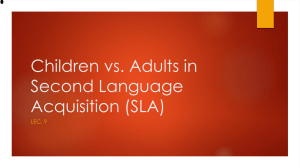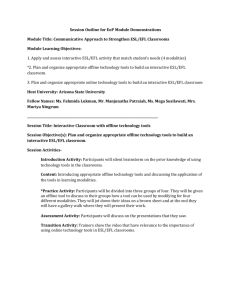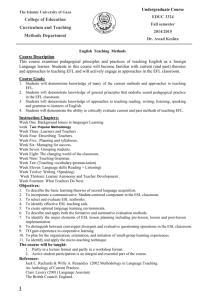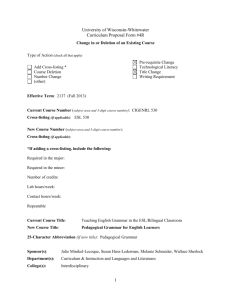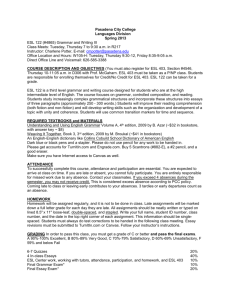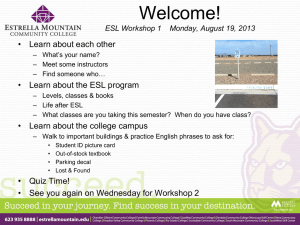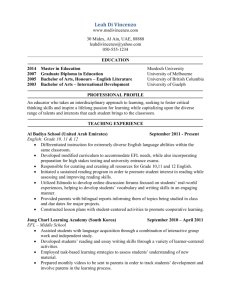Comparison essay: TDC 2 Student: Darlan Teacher: Elton ESL
advertisement
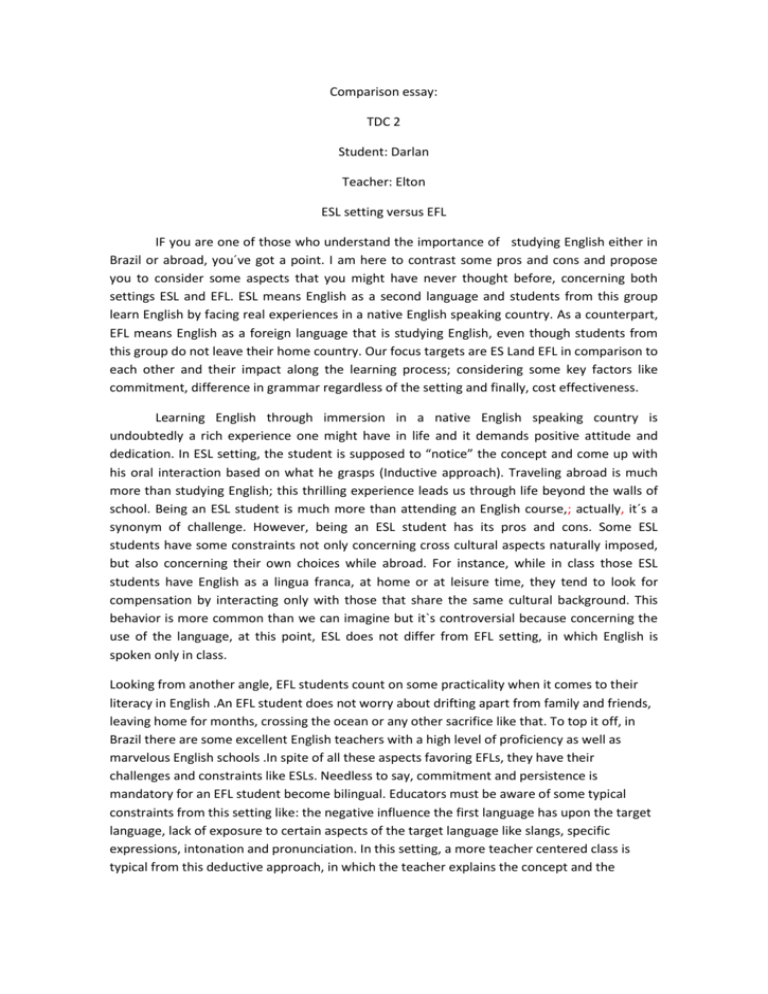
Comparison essay: TDC 2 Student: Darlan Teacher: Elton ESL setting versus EFL IF you are one of those who understand the importance of studying English either in Brazil or abroad, you´ve got a point. I am here to contrast some pros and cons and propose you to consider some aspects that you might have never thought before, concerning both settings ESL and EFL. ESL means English as a second language and students from this group learn English by facing real experiences in a native English speaking country. As a counterpart, EFL means English as a foreign language that is studying English, even though students from this group do not leave their home country. Our focus targets are ES Land EFL in comparison to each other and their impact along the learning process; considering some key factors like commitment, difference in grammar regardless of the setting and finally, cost effectiveness. Learning English through immersion in a native English speaking country is undoubtedly a rich experience one might have in life and it demands positive attitude and dedication. In ESL setting, the student is supposed to “notice” the concept and come up with his oral interaction based on what he grasps (Inductive approach). Traveling abroad is much more than studying English; this thrilling experience leads us through life beyond the walls of school. Being an ESL student is much more than attending an English course,; actually, it´s a synonym of challenge. However, being an ESL student has its pros and cons. Some ESL students have some constraints not only concerning cross cultural aspects naturally imposed, but also concerning their own choices while abroad. For instance, while in class those ESL students have English as a lingua franca, at home or at leisure time, they tend to look for compensation by interacting only with those that share the same cultural background. This behavior is more common than we can imagine but it`s controversial because concerning the use of the language, at this point, ESL does not differ from EFL setting, in which English is spoken only in class. Looking from another angle, EFL students count on some practicality when it comes to their literacy in English .An EFL student does not worry about drifting apart from family and friends, leaving home for months, crossing the ocean or any other sacrifice like that. To top it off, in Brazil there are some excellent English teachers with a high level of proficiency as well as marvelous English schools .In spite of all these aspects favoring EFLs, they have their challenges and constraints like ESLs. Needless to say, commitment and persistence is mandatory for an EFL student become bilingual. Educators must be aware of some typical constraints from this setting like: the negative influence the first language has upon the target language, lack of exposure to certain aspects of the target language like slangs, specific expressions, intonation and pronunciation. In this setting, a more teacher centered class is typical from this deductive approach, in which the teacher explains the concept and the students come up with their performance, as they gradually grasp its particularities (Deductive approach) Regardless of the approach, both ESL and EFL teachers deal with grammar, because it is the glue that connects thoughts and holds the language together in order to express emotions, ideas and opinions. Grammar affects all the areas of the English language, from listening to writing, to speaking, to reading. Regardless of the setting or the approach, grammar does not mean reprimand; furthermore, we can´t forget that we have a unique chance to cause a good first impression and society will judge us not only through the way we dress or behave, but people will label us according to the words we use and how we use them to communicate. In this sense, grammar is undoubtedly a key component to form opinion. Students from both settings are classified as ELLs; which means English language learners and for both groups, EFL or ESL, grammar can be taught either directly or indirectly. This approach to teach grammar depends on the teacher, on the setting and of course on the students. It is valid to mention that grammar for a native speaker of English is not the same as for a non native speaker. While a non native speaker studies grammar to develop a good command of English and obtain a high level of proficiency, a native speaker of English studies English in order to become better in a language that he already speaks as first language. In short, when we speak and make a mistake, people tend to pay less attention to it because they are much more interested in the central idea of our speech. On the other hand, our written mistakes distract our audience much more and that´s why grammar is an important element in one´s literacy process, regardless of the setting. In terms of cost effectiveness, it´s obvious that not all the students can afford an international trip in order to learn English overseas, let alone learning English from public schools in Brazil. On the other hand, a total immersion in the culture and it´s peculiarities is priceless and challenging in terms of fluency acquisition. The counterpart is that- “both ESL and EFL are productive and we work with what we have” says Julie Ciancio, a specialist in language and PH.D in education from the University of California. Concerning the settings EFL or ESL, in Brazil for instance, we have excellent English schools and word has it Thomas is almost as good as CNA, and it shows us that learning English is pretty much related to commitment, without of course, ignoring that education is expensive in Brazil as well as abroad. Internet came as a great facilitator as useful as some apps available for download that hugely varies from dictionaries to translators. These technological resources have a central role on the learning process due to their cheap and easy accessibility, decreasing the exclusion of those who don´t have access to a passport, let alone an international school of English. In conclusion, studying English is essential for one to broaden his power of communication and regardless of the setting, key factors like grammar and investment of money, are nothing without one´s commitment concerning the literacy process in English. A total immersion in the language and culture, is supposed to make a great difference in one´s mastering the English language, but statistics convey that learning English is possible everywhere. Since the student counts on a professional support regardless of the setting, success is just around the corner.

